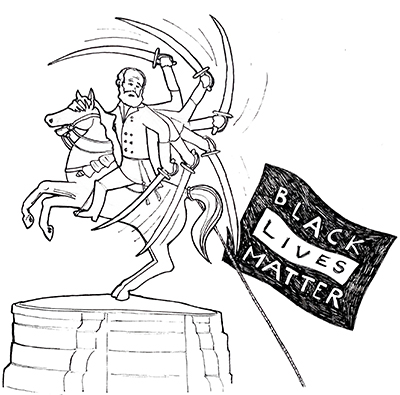Review: Tanya Lavin, Culture Warlords: My Journey into the Dark Web of White Supremacy. New York: Hatchette Books, 2020)
One of the more annoying products of the four Trump years has been a certain genre of very lamentable journalism in which legacy media platforms seek to understand, and come to terms, and even empathize, with Trump’s supporters.

Often appearing in high-end outlets like the New York Times, these articles – such as an egregious November 2017 NYT portrait of the Ohio neo-Nazi Tony Hovater – exude an ethnographic tone in seeking to unpack the concerns and political motivations of these seemingly exotic Trump voters who are invariably white and working class and usually male (or, at the very least, have “normal” ideas about gender and sexuality). The effect is to normalize Trump and Trumpism, pitching it as the manifestation of the legitimate economic grievances of lower-income rust-belt workers left behind by deindustrialization in the rust-belt, to push aside racist and homophobic hatreds as explanations for Trump’s support, and to generally exonerate higher-income voters from any guilt, even with their statistically well-documented support for Trump, his tax cuts and his anti-socialism.
Talia Lavin decidedly does not take this approach in her study of the contemporary online far-right. In a recent interview, indeed, she cut into the “moral toddlerism” of American journalism and its inabilities to provide mature analyses of Trump. Culture Warlords thus aims to provide a serious journalistic alternative. For about a year, Lavin spent time inhabiting a number of interconnected online ecosystems: white supremacist dating sites, where she posed as a white Iowan waitress called Ashlynn, various militia telegram channels, message boards for incels (men who insist their inability to date is the fault of insidious feminist conspiracies), Christian and neo-pagan extremist websites. A common denominator across all of these online space is a pervasive anti-Semitism; “Jews” function as a kind deus ex machina for the contemporary alt-right, explaining everything from the workings of the global economy, media and academia (in their minds, all Jewish-run, of course) to their disappointments in Trump (because he is surrounded, and supposedly diluted, by people like Jared Kushner or Stephen Miller) and even their inability to get laid (Jews peddle feminism as part of a nefarious “white genocide” conspiracy).
Lavin herself is Jewish and underneath the unpacking of online hate cultures, the book also becomes an exploration of her own Jewishness, at times sensitive and even funny. She begins the book by describing herself as looking like “the matronly figure of a mother in a Philip Roth novel”. And she was clearly amused by her own ability to go undercover as “Ashlynn”, the white Iowan, or “Tommy”, a lonely incel, and then to eavesdrop on some of the most violently antisemitic exchanges imaginable. Nonetheless, she also recounts the unavoidably negative effects that inhabiting this world had on her; the intimate details in which she witnessed fantasies of anti-Jewish violence, sometimes even mentioning her by name, both disturbed her but also re-doubled her anti-fascism.
The book also showcases Lavin’s skewering verbal abilities – describing Andy Ngo as a “fascism-adjacent dickwad” or Stephen Miller as an “odious Nosferatu figure” are two memorable moments. In turn, Lavin also provides sharp dissections of the very online culture of the far right and an intimate sense of the atmosphere pertaining there. She identifies the incel community as the closest thing she could find “to an online community organized purely around misogyny”. But she also recognizes its unique appeal: “There’s something particularly disturbing about incel communities and their rhetoric, at least for me. Perhaps it’s because there’s a core of relatability in the worldview they describe. Who among us has not felt unworthy of love, obsessed about their appearance, or longed for intimacy and companionship that seemed impossible to attain?”
At another point, Lavin pauses to consider the point of all this: “Sifting through the details, and observing the nonstop, puerile nature of their speech, it can be easy to wonder precisely what the point of decoding all this hate is. Isn’t it just hate? Aren’t these just losers pontificating and arguing on the internet?” The closing sections of the book represent an answer to this, setting off from the obvious point that a whole slew of mass murderers – “Robert Bowers to Anders Breivik to Brenton Tarrant” – were radicalized via the kind of online communities Lavin examines. But more than that, as Lavin points out, the well-documented far-right sympathies in American police forces makes state-led interventions impractical and even dangerously naïve. The closing chapter is a robust argument in favor of popular anti-fascist activism – including, but certainly not limited to, the kind of revelatory work carried out in this book – as the surest protection against the Right.
The interminable period since November 2016 has seen a series of clear-headed accounts of the so-called Alt-Right: Kathleen Belew’s Bring The War Home, Alexandra Minna-Stern’s Proud Boys and the White Ethno-State, David Neiwert’s Alt-America. Talia Lavin’s gonzo-ish methodology adds an ethnographic and indeed microscopic closeness to this literature, a function of her willingness to not just study extremism from afar but to place herself foursquare within its humid confines. Never willing to concede ground to the far-right, the result is a polemical and utilitarian guidebook to some of the worst people in America.
Aidan Joseph Beatty teaches in the Honors College at the University of Pittsburgh and is the author of Masculinity and Power in Irish Nationalism.

